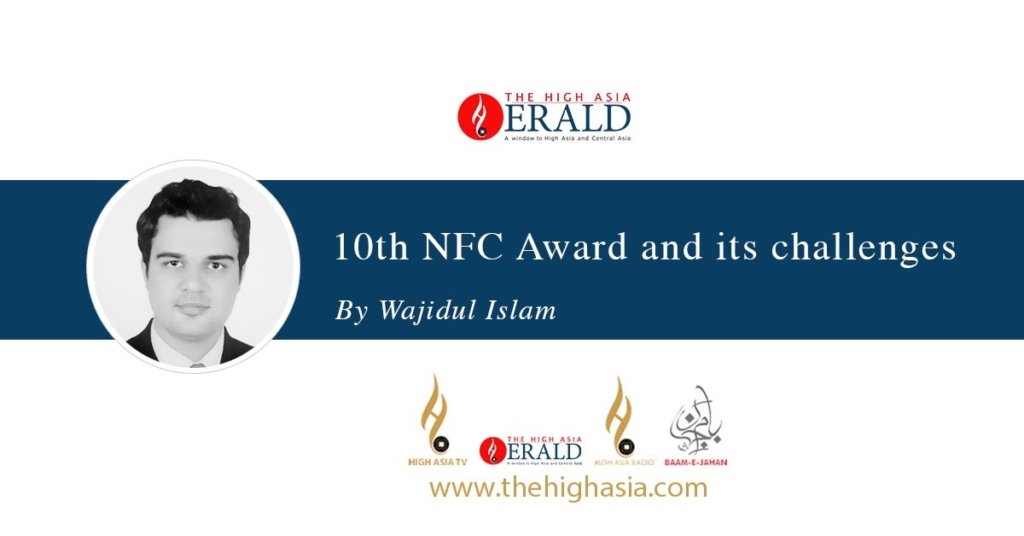By Wajidul Islam
The National Finance Commission (NFC) is a resource-sharing mechanism between the federal government and federating units. It was constituted under Article 160(1) of the 1973 Constitution. It is mandatory to constitute and hold the NFC meeting every five consecutive years.
The purpose of the award is to review the collection of revenues by the Centre from provinces and then redistribute vertically between the federal and the provincial governments, as well as horizontally among the provinces as well as smooth and equitable fiscal transfers from Centre to provinces that may lead to the development and prosperity of all federating units.
Over time, the divisible pool has expanded due to heavy reliance on indirect taxes as well as improvement in the collection. The population is the sole distribution criterion, adopted in all NFC awards from the divisible pool. This has raised friction among the provinces, necessitating the inclusion of other potential variables.
The history of resource distribution is long and dates back to pre-independence, but here we will not dig into its history and our main focus will be on the challenges faced by the country in constituting and formulating the 10th NFC award.
The debate in national media has started since the notification of the award. A very insightful and fruitful debate was held at the Pakistan Institute of Development Economics (PIDE). A number of experts participated in the discussion through a webinar to share their views regarding the new NFC and the challenges it will face.
One of the participants termed the NFC Award the most progressive in the history of the country. Another expert termed it a political award and gave the rationale that during the last two military regimes of Ziaul Haq and Pervez Musharraf, no NFC award was successful. In the Zia era, two attempts were made in 1979 and 1985, but they remained inconclusive. Similarly, the Musharraf era awards of 2000 and 2005 were also inconclusive.
In 2010 a democratic government succeeded in reconstituting and formulating the 7th NFC award acknowledging the demands of the smaller provinces for the first time in the history of the country. An improved formula for a multi-dimensional revenue distribution was introduced. Apart from the population (82%), other variables like backwardness and poverty (10.3%), revenue generation and collection (5%), and inverse population density (2.7) criteria were also included.
Is the federal government biting off more than it can chew?
Apart from this, it is also made mandatory under the Constitution that the share of provinces will increase in every NFC award and it cannot be decreased. This has sparked a new debate in the country. The current tiff between the Sindh government and the federal government is also attributed to the NFC Award and the 18th Amendment.
The Centre argues that provinces have to contribute from their share for federal expenses. The leftover budget with the federal government is so minimal that it can merely fulfil administrative needs because the federal government is maintaining law and order, foreign policy, defence matters, debt servicing, public welfare, development, industries, agriculture, tourism, environment protection, currency management, health, and education. Moreover, it also wants the provinces to bear the losses of state-owned enterprises.
To fulfil the aforementioned needs, the federal government heavily relies on budget deficits, which means burgeoning debts and further pushing the economy into shambles. The situation is already exacerbated by low revenue collection and thus the pie is shrinking day by day.
But the real questions are: does the demand of the federal government justifiable? Is the federal government biting off more than it can chew? Will this award be able to see the light of day or its fate will be similar to the previous 6 awards?
The answer is a simple ‘No’, as the 18th Amendment has devolved the powers to provinces. Then, why the federal government has still not abolished the different ministries which fall in the domain of provincial governments like health, education, environment, tourism, development, irrigation, and public welfare?
Why the Centre is still financing the HEC? Why it is spending billions of rupees on BISP? What is the need for keeping an oversized bureaucracy, a fleet of ministers, special assistants, and advisers in the federal cabinet?
If the federal government wants to make the 10th NFC award a success, then it has to switch off its political mode and follow the true spirit and principle of federation. It has to reduce its unnecessary expenses and cut its coat according to its cloth, otherwise, it will crumble under the weight of its own extravagance.
There should always be room for negotiation and various options should be taken into consideration before finalizing this award as we have not reached the point of no return. Sane decisions will create a win-win situation for both centre and provinces and remaining adamant will push both to a further financial mess.

Wajidul Islam is doing his MPhil at the Pakistan Institute of Development Economics Islamabad. He has a special interest in poverty and development.

The High Asia Herald is a member of High Asia Media Group — a window to High Asia and Central Asia

